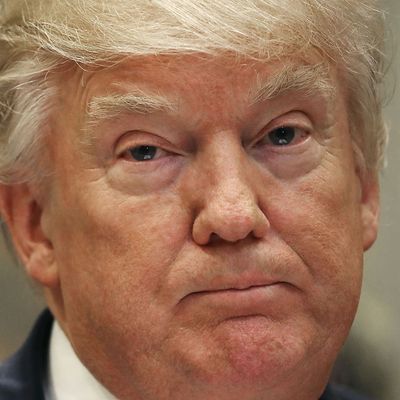
On the morning of June 23, 1972, Richard Nixon instructed his chief of staff, H.R. Haldeman, to contact L. Patrick Gray, the acting director of the FBI, and ask him not to investigate the Watergate break-in. “That the way to handle this now is for us to have [CIA Deputy Director Vernon] Walters call Pat Gray and just say, ‘Stay the hell out of this … this is ah, business here we don’t want you to go any further on it,’” said the president. [Correction: Haldeman said this, Nixon concurred.] The conversation remained secret until Nixon was forced to release a recording on the conversation on July 24, 1974. The recording, which became known as the “smoking gun tape,” had a seismic effect: Eleven Republicans on the House Judiciary Committee announced their support for impeachment.
The New York Times bombshell report that James Comey has a contemporaneous memo describing a conversation in which President Trump asked him to halt the bureau’s investigation of Michael Flynn, the national security adviser who had resigned the day before, follows a similar pattern. Both episodes involve the president attempting to quash an FBI investigation into their associates. Both investigations pertain to crimes of which there is no proof the president had any involvement. Just as no conclusive proof ever found that Nixon ordered the break-in of Democratic headquarters during the 1972 election, there is not yet any clear proof that Trump’s campaign colluded with Russia’s electronic break-in to Democratic electronic records during the 2016 election. The attempted manipulation of justice is, in both cases, the more serious crime.
Comey’s memo — which is “two pages long and highly detailed,” the Washington Post reports — is the kind of document that would be admissible as evidence. In addition to the memo, the contents of which have been confirmed by numerous other news organizations, Trump has publicly suggested he has recordings of the conversation with Comey — a claim the administration has refused to deny or even to discuss in any fashion.
And the crime detailed in the reported Comey memo, like the smoking-gun tape, is of the utmost seriousness. It is evidence of the president attempting to turn the FBI into an organ of personal control. In addition to the request to lay off Flynn, Trump reportedly asked Comey to direct his resources to the prosecution of leakers within the administration and journalists who report on the leaks.
Much of the surrounding public evidence — Trump reportedly asked for Comey’s pledge of loyalty, proceeded to fire Comey, and then told NBC’s Lester Holt that the Russia investigation played a role in the firing — confirms the most dire conclusions. Trump has abused his power and perverted the functioning of the government in a way utterly inconsistent with democratic government as Americans understand it. If the FBI can be unleashed on the president’s enemies, and restrained from prosecuting his allies, then the presidency would become an instrument of authoritarian control.
Here is what must happen next. Democrats must ask the Republican majority — which has so far resisted any bipartisan investigation that would grant subpoena power to the minority party — if they will subpoena Comey’s memos and any tapes that the White House has. Any of Trump’s critics, from the left to the right, who care about safeguarding the republic should organize and join public demonstrations demanding these moves. And then, unless Comey has somehow, unimaginably, lied about the content of his memos, Trump must be impeached.






























